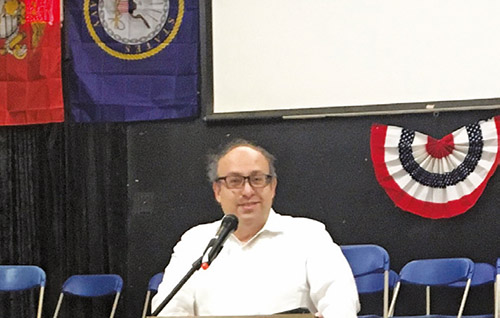
On November 14, Bi-Cultural Hebrew Academy’s Center for Community Education hosted Rabbi Nati Helfgot’s presentation “Homosexuality, Jewish Thought, and What Do We Teach Our Children?” The rabbi is author of the 2010 Statement of Principles on the Place of Jews With a Homosexual Orientation in our Community, which stated that God created everyone in his image, deserving respect and dignity, allowing individuals to participate and be treated like any other member of the community.
Rabbi Helfgot began: “What I say is my own view, thinking about this very wrenching and challenging issue of the theological question of the reality of gay members of our community.” He described how the world has changed since he wrote his principles in 2010. President Obama opposed gay marriage. Recently, we had a candidate for president campaigning with his husband. The cultural and social landscape has changed. It’s reality in the Jewish community.
As part of SAR’s think tank, Machon Siach, Rabbi Helfgot explored theological perspectives on homosexuality in contemporary Jewish thought. “My starting point was a 2016 article by Aaron Segal, principal of Shalhevet, an LA Modern Orthodox high school, that the reconciliation and Torah’s discussion of homosexuality represents the single most formidable religious challenge for him.
“Today, more young people are coming out than ever before, and that puts a face to this theological challenge,” Rabbi Helfgot continued. “As they go off to college, students face the painful moral dilemma created by the seemingly intractable conflict—believing in the primacy and validity of Torah on one hand, and following their hearts’ sense of morality with regard to loving and accepting their gay friends, perhaps coming out themselves, resulting in our children losing faith in Torah as a moral way of life.
“I am not here this morning to discuss halachic details. I don’t have the authority or ability to change halacha. I looked at different perspectives in the last 50 years of Orthodox thinkers and attitudes towards homosexuality and halacha. There was negative language used towards gay people across the world. Some Jewish thinkers of the 20th century, whom we hold in great esteem, shared the belief of most of society: Homosexuality is choice, a perversion.”
“In the ’80s and ’90s, people wrote different approaches—a divine Decree, that God has some sort of divine plan for people with same-sex attraction who may be able to play a role in a society that’s different than someone married and having children. The Torah presents proscriptions against homosexual activity. Just as we believe many laws don’t have explicit rationale, rationale doesn’t make the law continue. The law is the law the law.
“The Torah prohibition even against natural inclinations, the Torah might still absolutely say that it’s for the purpose of societal good that the Torah forbade this kind of action. It may be because of the Torah, especially in the world in which the Torah was given and until the modern period, the idea of sexual identity didn’t exist. When we argued about the possible rationales are, the desire of the Torah to focus on the potential to procreation, the danger to the marital relationship when men look for sexual fulfillment outside of marriage, and that many homosexual liaisons were non-consensual. It is against homosexual sexual activity because it undermines values which the Torah felt were critical to creating family, society and nation.”
Rabbi Helfgot noted: “One could believe that the Torah was not primarily addressing the concept of committed monogamous relationships between two consenting adults, which did not exist for most of human history. Maimonides, in ‘The Guide for the Perplexed,’ wrote that legal systems are universal; that’s the nature of legal systems including the Torah, even if it’s suitable only for certain individuals and doesn’t pay attention to isolated cases. Rambam says there’s a percentage of people who may not fit into that category. Only a new Sanhedrin can legislate changes.”
In summary, Rabbi Helfgot believes, “Every person is created in the image of God and should be included in communal life across the spectrum of observance. At the same time, it’s very clear that halacha and Torah want a society in which family procreation is essential to the existence and future of the Jewish people. People with same-sex attraction struggle with the notion of the good, just, merciful God, yet can’t express everything in the context of current halachic norms. At the same time, maybe this theological construct gives us a way to think of that, and look towards the future.”
Rabbi Helfgot is the spiritual leader of Congregation Netivot Shalom in Teaneck. He was ordained by RIETS, holds a master’s degree in education from the Azrieli Graduate School of Yeshiva University and is the chair of the Talmud department at SAR High School.
By Judy Berger










